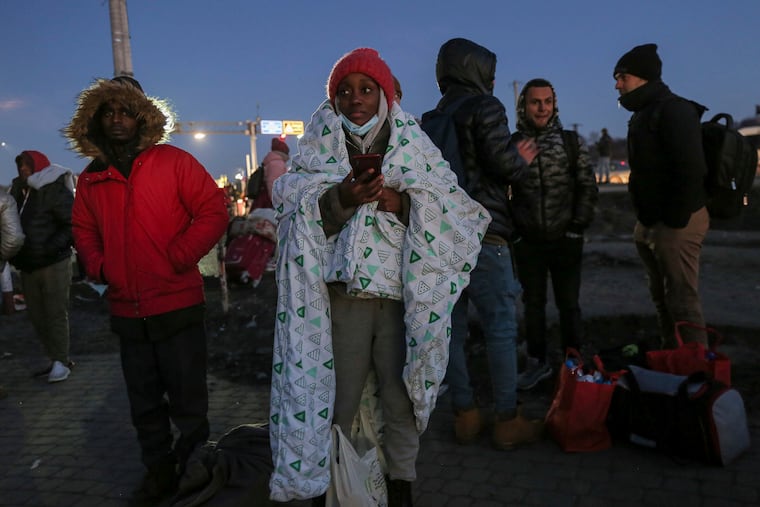The mistreatment of Black students trying to flee Ukraine is a reminder of racism’s reach | Solomon Jones
The plight of Africans attempting to leave the country underscores how humanity is often the first casualty of war, writes Solomon Jones.

I’ve tried to imagine going to sleep in a country where I live in relative safety and waking up in a place where the terror of war spills out onto city streets. I can’t. And that’s why my heart often breaks when I contemplate what’s happening in Ukraine.
However, when I saw videos that appeared to show African students being pushed aside by Ukrainian security officials as the Africans sought to flee a conflict that was not their own, my sympathies shifted. My emotions were torn, and my heart went out to the people who, like so many Blacks in America and beyond, are enduring the realities of racism. But now, there are no social buffers to dampen its effects — because in war, humanity is among the first casualties.
The African Union, which includes many of the students’ home countries, has taken notice of the accusations and spoken out. In a joint statement, two African Union officials — Moussa Faki and Macky Sall, who is also president of Senegal — said: “Reports that Africans are singled out for unacceptable dissimilar treatment would be shockingly racist and in breach international law.”
» READ MORE: How could America build a strong democracy in Afghanistan when we don’t have one here? | Solomon Jones
The stories are heartbreaking. Social media video shows a Black woman being physically pushed by men who appear to be security forces as she tries to board a train. CNN reported that an African medical student was ordered to get off a bus at a checkpoint near Ukraine’s border with Poland, forced to watch as only Ukrainians were allowed to board the bus and leave. Another African student told the news outlet that she and her Black compatriots had to walk in freezing temperatures as 10 buses filled with Ukrainians passed them by. An Indian student told CNN that non-Ukrainians had to wait in long lines in the cold as they sought to cross the border. She said the male students were beaten, and that she saw an Egyptian man thrown against a spiked fence with so much force that he passed out.
It’s not just the individual stories that are striking. It is the almost reflexive racism that they illustrate. That in a time of war, when those with whom they share ethnic bonds are killing their women and children, Ukrainians are lashing out at people of color who want nothing more than to leave.
It’s ironic, really. Colleges and universities in Ukraine are educating 16,000 students from Morocco, Egypt, and Nigeria alone. Other students hail from Ghana, Kenya, and other African nations. They go there because Ukrainian universities offer the same quality education as schools in Western Europe but at less cost. As the Russian invasion rages on, however, those African students are paying a far steeper price than anyone could have imagined.
“Ukrainians are lashing out at people of color who want nothing more than to leave.”
I remain sympathetic to the cause of the Ukrainians. They are being attacked by Russia — a nation led by a man who seems hell-bent on reclaiming the glory days of the Soviet Union, no matter what it costs the Ukrainians, and no matter how much Western sanctions damage the Russian economy.
But I am empathetic to the plight of the thousands of Black students stuck in Ukraine. I see myself in them. They came with the optimism of youth and the desire for knowledge. They came seeking lessons that would set them on the path to careers as engineers and doctors.
If and when they get out of Ukraine, they will leave with lessons of a different sort. They will know that they are rare, and their distinctiveness comes with a cost. They will know that life is unfair and that its cruelty crops up at the most inopportune moments. They will know that they are stronger than they think they are. They will know, in no uncertain terms, that they are Black.